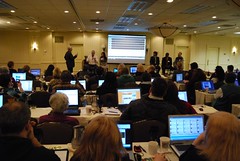 Image by rogercarr via FlickrE-commerce helped to turn conventional marketing strategies upside down, and added dynamism to the marketing landscape. The internet generated article marketing, added another notch to niche marketing, and also launched affiliate or associate marketing. As a result, affiliate marketing is now at the top of every strategic business plan. Because of its success, it is now regarded as the top online marketing strategy. So just what exactly is affiliate marketing, and why do you need to know about it?
Image by rogercarr via FlickrE-commerce helped to turn conventional marketing strategies upside down, and added dynamism to the marketing landscape. The internet generated article marketing, added another notch to niche marketing, and also launched affiliate or associate marketing. As a result, affiliate marketing is now at the top of every strategic business plan. Because of its success, it is now regarded as the top online marketing strategy. So just what exactly is affiliate marketing, and why do you need to know about it?In response to the first question, affiliate marketing is a marketing technique where a merchant, (product owner or service provider), rewards affiliates, for each referral. These referrals are generated as a direct result of the affiliate's marketing initiatives. Every business owner needs to understand affiliate marketing, because it is big business. It now generates billions of dollars in sales revenue on an annual basis. Revenue flows both to the business owner, and to the affiliate.
 Image via WikipediaWhen well orchestrated, affiliate marketing is a very effective marketing tool. It will result in an increase in website traffic, as well as an increase in revenue. Essentially, it is a revenue sharing approach to marketing, and involves a contract between a merchant on the one hand, and an affiliate on the other. Merchants will be able to gain maximum exposure for their brand, without having to spend any money if there are no results. This exposure will lead to increased revenue and profit. The affiliate will also increase revenue, as payment is based on the number of referrals made.
Image via WikipediaWhen well orchestrated, affiliate marketing is a very effective marketing tool. It will result in an increase in website traffic, as well as an increase in revenue. Essentially, it is a revenue sharing approach to marketing, and involves a contract between a merchant on the one hand, and an affiliate on the other. Merchants will be able to gain maximum exposure for their brand, without having to spend any money if there are no results. This exposure will lead to increased revenue and profit. The affiliate will also increase revenue, as payment is based on the number of referrals made.In terms of revenue sharing, affiliate marketers are paid a commission for the business they refer. They will either direct traffic to the merchant's website, or help to sell their products by placing the merchant's advertisement on their site. The joint venture between the merchant and affiliate is usually formalized by way of an Affiliate Program. There are several programs which are now used, the two most popular are Pay Per Click, and Pay Per Performance.
As the name Pay Per Click suggests, the affiliate is paid each time a visitor 'clicks' on the banner or link that directs them to the merchant's website. The affiliate will be paid even if the visitor does not make a purchase. This is probably the least lucrative affiliate program option, because payment tends to be small, usually about $0.05 to $0.10 per click. Pay Per Performance includes both Pay Per Lead and Pay Per Sale. With Pay Per Lead, the affiliate marketer will get paid on every occasion that a visitor clicks through to the merchant's website, and then takes some action that creates a lead for the merchant.
With Pay Per Sale, an affiliate gets paid every time a sale is generated by a visitor that clicks through from the merchant's ad on the affiliate's site. This is a more lucrative option, as the commission can be as much as 20% of the final sale price. However, it is only beneficial if the conversion rate of leads to sales is relatively high, for the product or service. Affiliate marketing is now a very profitable method of advertising products and services. The merchant is able to market their product on several sites, and in the case of a Pay Per Sale program, those ads are free until a sale is made. In this way, merchants can ensure that their marketing dollars are being put to the best use.
One of the most successful proponents of affiliate marketing is Amazon.com. Amazon has built a successful associate marketing program, which boasts over 1 million affiliates. As with any good marketing tool you do have to plan for success. So the basis of any affiliate program must be a good overall business plan, a good product and a solid marketing strategy.
Are you looking for an excellent affiliate marketing tutorial? Discover the secrets of being an affiliate right now:
Article Source:http://EzineArticles.com/?expert






No comments:
Post a Comment